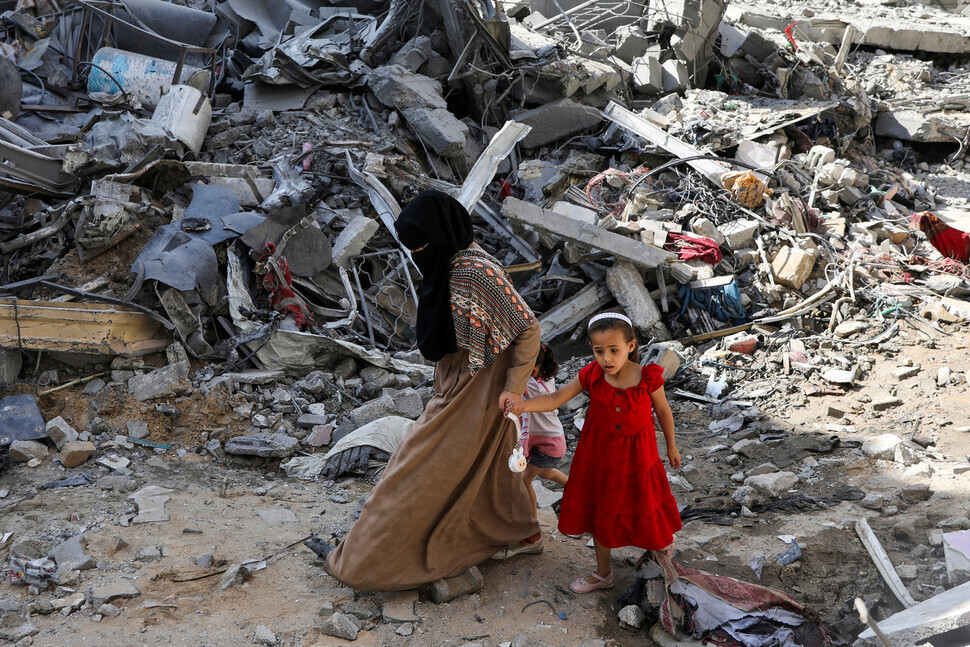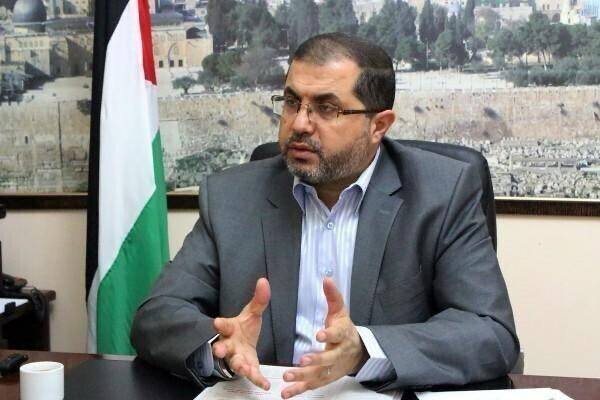hankyoreh
Links to other country sites 다른 나라 사이트 링크
Three expert views of the war in Gaza: From a Hamas official to Israel’s ambassador in Seoul

“Israel’s aim is to end the Hamas military and political capacity in Gaza.” — Akiva Tor, Israeli ambassador to South Korea
“They have failed to achieve any of their goals. They continue to fight but without a clear goal.” — Basem Naim, senior member of the Hamas political bureau
“There's certainly a powerful faction within the Israeli government who would like it to not only occupy Gaza for a long time, but also re-establish Israeli settlements there.” — Dov Waxman, professor, University of California, Los Angeles
Over eight months have passed since the war in Gaza began with a surprise attack against Israel on Oct. 7 by the Palestinian armed faction Hamas.
Since hostilities began, the Israeli military has continued to carry out large-scale bombardments and ground force strikes on Gaza, causing endless civilian casualties in the region. According to figures shared by the Gaza Health Ministry, a total of 37,084 deaths and 84,494 injuries had been recorded in Gaza as of June 9.
Recently, some in Israel have been pessimistically predicting the war will continue at least through the end of the year.
The Hankyoreh spoke to experts and the people directly impacted by the situation to hear their opinions on whether Israel can achieve its aim of “eradicating Hamas,” what the future for Gaza looks like after the war ends, and whether the traditionally suggested “two-state solution” to the Israel-Palestine conflict is still valid.
Between June 3 and 5, the Hankyoreh conducted video and in-person interviews with three of these people: Basem Naim, a former Gaza health minister (2006–2012) who is currently a senior official with the Hamas political bureau; Akiva Tor, Israeli’s ambassador to South Korea; and Dov Waxman, a professor who heads the Nazarian Center for Israel Studies at UCLA.

How will the war end, and what’s in store for Gaza?
“Unfortunately, they have no idea how to end the war.”
Speaking to the Hankyoreh over video call on June 3 from his office in Doha, Qatar, Basem Naim pointed to “internal conflict” on the part of Israel as a roadblock to ending the war.
“Some of the ministers in the cabinet are talking about the reoccupation of the Gaza Strip and resettlement of the Gaza Strip by bringing in new Jews. Others are talking about stopping the aggression now and leaving Gaza and giving it self-sovereignty,” he said.
“They have failed to achieve any of their goals: to crush the resistance, to evacuate Gaza, and to get back the captured Israelis. They have failed to achieve any of these goals because of their internal conflict, internal division. They continue to fight but without a clear goal,” he went on, saying that it would be “impossible” for the Israelis to achieve any of their goals.
Indeed, there are a number of varying opinions within Israel about Gaza’s future after the end of the war. Within Israeli Prime Minister Benjamin Netanyahu’s own coalition government — widely considered the farthest right government since Israel’s inception — far-right figures like National Security Minister Itamar Ben-Gvir and Finance Minister Bezalel Smotrich, among others, have gone so far as to call for the reestablishment of Jewish settlements in Gaza.
But Israel’s top envoy in Seoul pushed back on the idea when he spoke to the Hankyoreh on June 5.
“Israel will not occupy Gaza or establish settlements there,” Ambassador Akiva Tor said. When it comes to these far-right ministers, the ambassador said, “They have influence on the government position, they push things in a certain way. But in no way can we construe their views as the views of the Israeli government.”
“Israel has basically two war aims in the war with Hamas: one is to end Hamas in Gaza militarily and politically, and number two is to return the hostages alive,” the ambassador said. “So far we haven’t succeeded in ending Hamas’ capacities. There are still intact Hamas brigades in Rafah. It’s possible that Yahya Sinwar, the leader of Hamas, is outside of Rafah, somewhere in Khan Younis or other places where the Israeli army is already active, but we can’t find them.”
There have also been suspicions that Israel is attempting to use the current war to push Gaza residents out, such as by forcing them across the border into Egypt’s Sinai Peninsula.
When speaking to the Hankyoreh on June 5, Dov Waxman, the UCLA professor, predicted that while the longer the war drags on, “the greater the likelihood that Israel might end up establishing settlements in the West Bank,” he didn’t think there was “as much risk about the forced removal or forced displacement [of Palestinians] outside the Gaza Strip.” That’s because Egypt would see such a move as a threat to not only its sovereignty, but its security, the professor said.
The real question is whether Gaza will be “habitable” if the war goes into the long term, according to Waxman. Since Israel’s invasion of Gaza, there’s been “forced displacement” of Palestinians happening within the strip itself, and there’s a “real risk that they will not be allowed by the Israelis to live in certain areas of Gaza,” particularly in border regions where Israel’s army may want to create buffer zones.
Does any hope remain for the two-state solution?
“I think it’s a fantasy that there is some alternative option that is not Hamas or the Palestinian Authority,” says Waxman.
As for Israel’s plans after the war, he says, “They may be able to find Palestinians in the Gaza Strip who are willing to work with Israel, and to cooperate, but I think it would be very likely that they would be assassinated by Hamas. As long as there are Hamas fighters there, they will prevent any other Palestinian entity from taking power.”

The Israeli government has failed to put forth any concrete postwar plans for over eight months now. Their only contentions have been that they can no longer coexist with Hamas, and that they will not hand over Gaza to the Fatah-centered Palestinian Authority, who they do not trust.
“Israel has become skeptical of the likelihood of a successful Palestinian state which will not quickly radicalize and fall under Hamas domination,” said Tor, the ambassador. As for now, the establishment of a Palestinian state is out of the question, he said.
While the two-state solution in which Israel and Palestine coexist as two separate states has long been advocated for by the international community as a solution to the Israel-Palestine conflict, Netanyahu’s government remains skeptical.
“Ultimately Gaza’s future has to be Palestinian governance,” said Tor, who suggested “autonomy” as an alternative to “statehood.”
Arguing that we must “avoid a situation where Palestinian state will be established, it radicalizes and forms a military alliance with Iran,” Tor said that Palestine cannot be granted statehood status right away. Instead, he noted the possibility of an Arab state coalition forming an interim rule within Gaza until Palestinian governance could be erected, after which point successful autonomy, wherein extremist groups renounce the use of force against Israel, could develop ultimately into a two-state solution.
Hamas, however, maintains that Israel and the world must recognize Palestinian statehood.
“Hamas has said, ‘Yes, we accept an independent sovereign state on the border with guaranteeing the right to oblige the right to return for all refugees,’” Naim says. “The international community is obliging Israel to respect its obligations under international law.”
Naim stressed that elections must be held so that Palestinians can choose their own leaders. As for after the war, he says, “Plan A is to have a Palestinian unity government representing all Palestinians, and this government has to rule the area in the Gaza Strip, in the West Bank and in Jerusalem.”
Can Israel ever “eradicate” Hamas?
“The question is: Can Israel destroy Hamas’ ability to harm us?”
Acknowledging that Israel “can’t eradicate Hamas as an ideology,” Tor suggests that the key focus should be on destroying the group’s military capabilities. Since the start of the fighting, Israel’s government has put forth the two goals of eliminating Hamas and bringing home the hostages as its justification for its prosecution of the war. But even as it expounds the rhetoric of "eradicating" Hamas, Israel is well aware that it won’t be able to stamp out Hamas as a political and social movement of resistance to Israeli occupation.

The experts agreed that while Israel could undermine Hamas’ military capabilities, wiping the group off the map would be impossible. Because Hamas is a “multifaceted organization” made up of military, political and social wings, even if Israel were to defeat Hamas’ military wing, that “doesn’t mean to say that there will no longer be any militants drawn to Hamas, its ideology,” says Waxman. “So Hamas becomes militarily much weaker, but politically much stronger.”
In particular, Waxman points to the fact that Hamas has bases outside the Gaza Strip and the West Bank, including those in Qatar and Türkiye, and has a fundraising network “around the world.”
Even if Hamas is brought to a point at which it no longer has the ability to stage the kind of attack it did on Oct. 7, unless a governing authority that is able to replace Hamas is erected, the possibility of “acts of violence and terrorism against Israelis” remains, he said.
“We’ve already seen that happen in northern Gaza after they were defeated, essentially, in northern Gaza, then the Israeli army pulled out from those areas, and very quickly, Hamas returned,” he said.
For that reason, it’s important to understand why Hamas has popular appeal among Palestinians, he says. “Hamas represents the armed struggle against Israel.”
Naim concurred on this point.
“Today, it is about Hamas. Thirty years ago, it was about Fatah. Thirty years ago, it was about the PFLP [Popular Front for the Liberation of Palestine]. Maybe in 10 years, you’ll have a new [name]. It is about Palestinians who are fighting — struggling for their freedom and dignity,” Naim said.
Will Biden’s proposal prove a breakthrough in ceasefire negotiations?
On May 31, US President Joe Biden proposed a three-phase plan for an end to hostilities between Hamas and Israel. The three steps consisted first of a six-week ceasefire, the withdrawal of Israeli forces from all high-density regions, and the exchange of 100 hostages for hundreds of prisoners; second of the release of all surviving hostages and prisoners, Israel’s withdrawal from Gaza, and the initiation of a permanent ceasefire; and third of the rebuilding of Gaza and the return of the bodies of hostages who have died.
Apart from its call for extending the temporary ceasefire even if discussions drag on before the second phase begins, the content was reportedly more or less identical to the proposed deal that fell apart in early May.
Hamas has said it was ready to “deal positively” with the proposal. Naim told the Hankyoreh, “We are ready to deal with this proposal.” But Israel has reiterated that Hamas must be eliminated.
“Hamas wants to remain in power in Gaza, they want to remain in power in Gaza, rebuild their capacity, they want to continue what they’re doing,” said Tor. “That will be very difficult for this Israeli government: to wake up after signing an agreement and see Yahya Sinwar raise the Hamas flag and declare victory.”
According to Waxman, the political goals surrounding the ceasefire talks make this a “zero-sum conflict.”
“A permanent ceasefire, under complete withdrawal of Israeli forces from the Gaza Strip — if that happens, in [Sinwar’s] mind, Hamas has won. Hamas wins this war, basically, by surviving,” the professor said. “That would be a defeat for Israel.”
By Noh Ji-won, staff reporter
Please direct questions or comments to [english@hani.co.kr]

Editorial・opinion
![[Editorial] Exploiting foreign domestic workers won’t solve Korea’s birth rate problem [Editorial] Exploiting foreign domestic workers won’t solve Korea’s birth rate problem](https://flexible.img.hani.co.kr/flexible/normal/500/300/imgdb/original/2024/0626/5517193887628759.jpg) [Editorial] Exploiting foreign domestic workers won’t solve Korea’s birth rate problem
[Editorial] Exploiting foreign domestic workers won’t solve Korea’s birth rate problem![[Column] Kim and Putin’s new world order [Column] Kim and Putin’s new world order](https://flexible.img.hani.co.kr/flexible/normal/500/300/imgdb/original/2024/0625/9617193034806503.jpg) [Column] Kim and Putin’s new world order
[Column] Kim and Putin’s new world order- [Editorial] Workplace hazards can be prevented — why weren’t they this time?
- [Editorial] Seoul failed to use diplomacy with Moscow — now it’s resorting to threats
- [Column] Balloons, drones, wiretapping… Yongsan’s got it all!
- [Editorial] It’s time for us all to rethink our approach to North Korea
- [Column] Why empty gestures matter more than ever
- [Editorial] Seoul’s part in N. Korea, Russia upgrading ties to a ‘strategic partnership’
- [Column] The tragedy of Korea’s perpetually self-sabotaging diplomacy with Japan
- [Column] Moon Jae-in’s defense doublethink
Most viewed articles
- 1CIA record confirms US ‘completely destroyed’ Seoul’s Haebangchon in 1950 bombardment
- 2Dispatched into unknown danger, foreign day laborers were defenseless against blaze
- 3Blaze at lithium battery plant in Korea leaves over 20 dead
- 4[Editorial] Exploiting foreign domestic workers won’t solve Korea’s birth rate problem
- 5Three expert views of the war in Gaza: From a Hamas official to Israel’s ambassador in Seoul
- 6How 17 km of river could be a fertile bed for NK-China-Russia cooperation
- 7[Editorial] Workplace hazards can be prevented — why weren’t they this time?
- 8North Korea, Russia are going backward into history, Yoon says of new defense pact
- 9North Korea sends trash balloons into South for second straight night
- 10How sanctions are backfiring to fuel a new Eurasian alliance